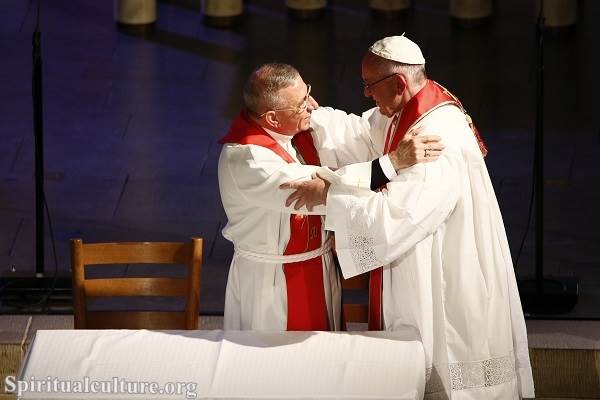For centuries, the question of women’s roles in church leadership has stirred hearts, challenged traditions, and inspired both reform and resistance. In the diverse and dynamic landscape of Protestant Christianity, this conversation has become increasingly vibrant—and vital.
Today, women are preaching, pastoring, planting churches, and shaping theology in ways that would have been unthinkable in many Protestant circles a century ago. Yet, the journey remains uneven, deeply theological, and culturally nuanced.
As Spiritual Culture, we invite you to enter this dialogue with open hands and seeking hearts. This is not merely a debate about titles or roles—it’s a sacred exploration of calling, gifting, and the Spirit’s movement across time. This article will explore the theological foundations, historical developments, denominational perspectives, and cultural shifts that shape how women participate in Protestant ministry today.
Theological Roots: Scripture and the Sacred Call
What Does the Bible Say About Women in Ministry?
The Bible offers a complex and often debated witness regarding women’s roles in spiritual leadership. Many Protestant traditions return to Scripture as the final authority on all matters of faith and practice. Therefore, any conversation about women in ministry must begin in the pages of the Bible.
Old Testament Women as Leaders
In the Hebrew Scriptures, we encounter powerful female leaders such as Deborah, a judge and prophetess (Judges 4–5), who led Israel in both military and spiritual matters. Miriam, sister of Moses, is called a prophetess (Exodus 15:20), and Huldah the prophet (2 Kings 22:14–20) plays a critical role in confirming the Book of the Law to King Josiah.
These stories challenge the notion that spiritual leadership was strictly male in the ancient world.
Jesus and Women in the Gospels
Jesus’ radical inclusion of women is central to any New Testament view. He welcomed women as disciples (Luke 10:38–42), healed them, taught them, and appeared first to women after His resurrection (John 20:11–18).
This was countercultural in a patriarchal society—and many see it as foundational for affirming women’s spiritual authority in the Church.
Paul’s Letters: Restriction or Liberation?
The Apostle Paul is often at the heart of the debate. On one hand, 1 Timothy 2:12 says, “I do not permit a woman to teach or to assume authority over a man.” On the other hand, Paul acknowledges women leaders like Phoebe (a deacon, Romans 16:1), Junia (a prominent apostle, Romans 16:7), and Priscilla, who along with her husband Aquila, taught Apollos, a learned man (Acts 18:26).
The tension lies in interpretation: are Paul’s restrictive instructions culturally bound or universally prescriptive?
The Holy Spirit and Spiritual Gifts
Many Protestant charismatics and Pentecostals emphasize that spiritual gifts are not gendered. As Peter declared on Pentecost quoting Joel, “Your sons and daughters will prophesy” (Acts 2:17). The Spirit’s anointing, they argue, is the clearest sign of divine calling.
A Brief History: Women and Ministry in Protestant Movements
The Reformation and Early Protestant Views
While the Reformation emphasized the priesthood of all believers, the actual practice of ordaining or platforming women was extremely rare. Reformers like Martin Luther and John Calvin upheld male leadership as normative, though the idea that every believer could read and interpret Scripture began opening new doors.
Revival and Renewal Movements
From the 18th century onward, women began emerging as leaders during spiritual awakenings:
- Quakers affirmed full equality, and many women preached.
- Methodist revivals saw women exhorting and leading prayer meetings.
- The Holiness Movement in the 19th century featured women evangelists like Phoebe Palmer.
- The Salvation Army, founded by William and Catherine Booth, empowered women to preach alongside men.
These movements, fueled by the urgency of revival, prioritized spiritual empowerment over institutional hierarchy.
Pentecostal and Charismatic Movements
The Azusa Street Revival (1906) was notably led by both Black and female ministers, and early Pentecostalism often gave women platforms to preach and pastor. Many modern Pentecostal denominations (like the Assemblies of God) continue to affirm women in ministry today.
Denominational Perspectives: Unity and Divergence
Denominations That Ordain Women
A growing number of Protestant denominations affirm and ordain women as pastors, bishops, and leaders, including:
- United Methodist Church
- Evangelical Lutheran Church in America (ELCA)
- Presbyterian Church (USA)
- American Baptist Churches USA
- The Episcopal Church
- Church of the Nazarene
- The Salvation Army
In these communities, women serve in leadership at all levels, and theological arguments have evolved to support egalitarian interpretations of Scripture.
Denominations That Restrict Women’s Leadership
Other Protestant bodies maintain a complementarian view—that men and women have equal worth but different roles, with spiritual authority reserved for men.
Examples include:
- Southern Baptist Convention
- Missouri Synod Lutheran Church
- Presbyterian Church in America (PCA)
- Reformed and many Calvinist traditions
These groups often cite Pauline texts and emphasize a created order in which male headship reflects divine design.
Cultural Shifts: Why the Conversation Is Growing
Globalization and Education
Increased access to theological education for women, alongside the global sharing of ideas, has contributed to more women feeling called and equipped for ministry. Online platforms and social media also allow women’s voices to be heard regardless of institutional limitations.
Changing Social Norms
The broader cultural shift toward gender equality has placed pressure on religious institutions to re-examine long-held positions. Younger generations, in particular, tend to question traditions that appear to limit women’s participation.
Witness and Mission
In many mission contexts, particularly in the Global South, women have been indispensable in spreading the Gospel. Their leadership often arises out of necessity, not institutional permission.
As one missionary leader said, “The harvest was plentiful, and the women were already there.”
Real Lives, Real Stories: Women Leading Today
Pastors, Preachers, and Prophets
Women like Beth Moore, Priscilla Shirer, Nadia Bolz-Weber, and N.T. Wright’s colleague Lucy Peppiatt represent diverse expressions of women’s leadership—from evangelical teaching to progressive preaching.
Some women serve as co-pastors with their spouses, others lead church plants, seminaries, or entire denominations.
Challenges and Breakthroughs
Despite progress, many women still face resistance, tokenism, or invisible barriers. They often walk a tightrope between strength and humility, calling and criticism.
Yet many testify that their calling is undeniable and their fruit unmistakable.
As one female pastor said:
“I didn’t ask for this mantle. But when God calls, He also equips—and He keeps opening doors no man can shut.”
Sacred Tensions: Unity in Diversity?
Theological Conviction vs. Institutional Tradition
Some Christians affirm women’s leadership in principle but hesitate in practice due to denominational constraints. Others remain sincerely convinced that male-only leadership is biblically faithful.
This conversation is not always about sexism—it’s often about Scripture, conscience, and tradition. Yet, where there is honest seeking, there is room for grace.
Can Protestants Disagree in Love?
Yes—and many do. Some churches within the same denomination hold differing views on women’s ordination. Others create space for women to teach or lead in certain capacities while reserving the title “pastor” for men.
The Protestant tradition, known for its diversity, offers a living laboratory for how convictions can coexist with charity.
What This Means for You
The question of women in Protestant ministry is not merely academic—it is deeply personal. It touches on how we see God, how we interpret Scripture, and how we discern the Spirit’s work in our midst.
Wherever you stand, this is an invitation to listen deeply. To seek not just to be right, but to be faithful. To recognize the sacred in those who lead, regardless of gender.
As Spiritual Culture, we encourage you to reflect:
- Have I allowed tradition to silence what God may be saying anew?
- Am I open to seeing leadership through the lens of gifting, not just gender?
- Can I bless those who serve—even if their calling stretches my assumptions?
In the end, this is not just a conversation about women. It is a conversation about the Church. About our future. About the Spirit who, even now, is pouring out on “sons and daughters” alike.
“In Christ, there is neither male nor female… for you are all one in Christ Jesus.” – Galatians 3:28
Let us continue the conversation—gracefully, prayerfully, and courageously.


